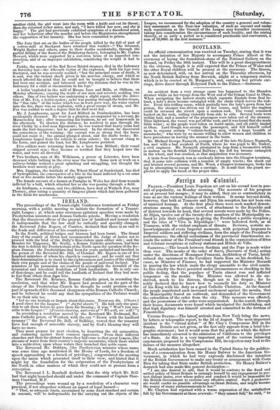IRELAND.
The proceedings of the Tenant-right Conference terminated on Friday morning, with a public meeting to initiate the formation of a Tenant- right League ; at which some strenuous agitatory speeches were made by Presbyterian ministers and Roman Catholic priests. Moving a resolution that the disastrous effects of the present law of landlord and tenant make
it indispensable that the law shall be radically and speedily changed, the Reverend John Rogers, of Cumber, declared that there is an end to the feuds and differences of his countrymen—
In the North, political badges and banners had been burnt. The Grand Jury of the county of Down had recommended the Judge of Assize not to proceed with the trial of the Dolly's Brae rioters upon either side ; and the
Member for Tipperary, Mr. Scully, a Roman Catholic gentleman, had been the first to defend the Presbyterians of the North upon the question of the Re-
glum Donum : the Presbyterians had been for years spoliated and insulted in
the person of the Reverend Mr. Dill, of Clonmel. Mr. Rogers is one of five hunth.ar ministers of whom his church is composed; and he could say that
their determination is to stand by the righteousness and justice of the claims of their own people and of the claims of the people of universal Ireland. The ministers of his persuasion are resolved to accomplish the downfall of the tyrannical and truculent feudalism of Irish landlordism. He is only one of that clergy, and he could tell the landlords of Ireland that they had more to fear from others than ftpm him. The Reverend Dr. Kearney, Roman Catholic priest, in seconding the resolution, said that what Mr. Rogers had promised on the part of the clergy of the Presbyterian Church he thought he could promise on the part of upwards of five thousand clergymen of the Roman Catholic Church ; and he believed he could say that the sympathies of the Prelates would be on their aide too.
"Let no one hesitate or despair about this cause. Never say die. (Cheers.) A good cheer for the League." (" Awful shouts.") He had only one ques- tion to ask them before he gave them his blessing; it was, " Won't you sus- cribe to the League ?" (Frantic cheering, and cries of" We will, we will!") In seconding a resolution moved by the Reverend Mr. Redmond, Ro- man Catholic priest, of Wexford, with the cry "Down with the landlord tyranny !" the Reverend Dr. Bell, of Ballibay, vowed that the tensntry have had enough of miserable slavery, and by God's blessing they will have no more.
They must prepare for next election, by forgetting the old animosities, and coalescing against their common oppressors. From their different churches and their far-distant homes they had come to that great League, like streams of water from their country's majestic mountains, which there united into a noble river, upon whose waters they launched that noble cause. The Reverend Mr. Dobbyn, [the lhesbyterian minister whose name was some time ago mentioned in the House of Lords, for a freedom of speech approaching to a breach of privilege,] congratulated the meeting upon the union which presented itself to their view, and hinted that it might lay the foundation for the cooperation of the Presbyterians of the North in other matters of which they could not at present form a conception.
The Reverend I. L. Rentholl declared, that the ship which Mr. Bell had that night launched should sail under the command of Captain Shar- man Crawford, M.P. The proceedings were wound up by a resolution of a character very practical, if not altogether without an aspect of legal hazard- ' " That, as adequate funds, ascertained by some fixed standard and certain ta amount, will be indispensable for the carrying out the objects of the League, we recommend for the adoption of the country a general and voluir- tary on the Poor-law valuation, of such an amount and under such regulations as the Council of the League may hereafter recommend, taking into consideration the circumstances of each locality, and the raising thereby, at as early a period as is considered practicable and convenient, a sum of 10,0001. in the first instance."


























 Previous page
Previous page